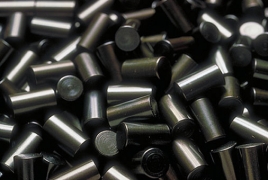Int’l uranium fuel bank to open in Kazakhstan June 11, 2015 - 21:36 AMT PanARMENIAN.Net - An international uranium fuel bank will open in Kazakhstan in two years, partly funded by U.S. billionaire Warren Buffett, after the board of the UN nuclear agency approved a hosting agreement on Thursday, June 11, with the Central Asian country, Reuters reports. The scheme is designed to secure the supply of uranium for nuclear power plants should the commercial market be disrupted. Advocates also see it as a way to dissuade countries from building enrichment facilities that might be misused to purify uranium to weapons-grade levels -- an issue that has bedeviled relations between Iran and the West for more than a decade. “If the dozens of countries interested in nuclear energy also choose to pursue uranium enrichment, the risk of proliferation of dangerous nuclear materials and weapons would grow beyond the tipping point. This has been our experience with Iran," said Sam Nunn, co-chairman of the U.S.-based Nuclear Threat Initiative (NTI), a non-governmental organization. The new fuel bank, the first outside the control of an individual country, "now gives countries an alternative to that choice and direction”, he said. The fuel bank, basically a storehouse in a metallurgical compound in northeast Kazakhstan, could house around 90 metric tonnes of low-enriched uranium (LEU) - enough to make fuel to run a 1,000-megawatt light-water reactor. Out of 438 operational reactors worldwide, around 350 are such light-water reactors, which can power a large city for three years, according to the U.N.'s International Atomic Energy Agency. Any IAEA-approved country could access LEU from the fuel bank at market prices. U.S. tycoon Buffett and the NTI donated $50 million to the project, and an extra $100 million came from the European Union, Kazakhstan, Kuwait, Norway, United Arab Emirates and United States. Kazakhstan was the only country to have volunteered to host the facility, which was first signed off by the IAEA board in 2010. Uranium enriched to a fissile purity of around 5 percent is considered LEU. Such LEU can be further enriched to around 90 percent, which is considered weapons-grade material. IAEA member states have the right to develop their own nuclear fuel cycle facilities. Iran, which rejects Western suspicions that it wants to build a nuclear weapon, has said in the past that one reason for developing its own enrichment program was to secure nuclear fuel supply for power plants and avoid disruptions of commercial LEU supplies. Iran and six world powers are seeking to finalize a deal by June 30 on curbing the scope of the Iranian nuclear program in return for an easing of international sanctions against Tehran. Authorities said a total of 192 Azerbaijani troops were killed and 511 were wounded during Azerbaijan’s offensive. In 2023, the Azerbaijani government will increase the country’s defense budget by more than 1.1 billion manats ($650 million). The bill, published on Monday, is designed to "eliminate the shortcomings of an unreasonably broad interpretation of the key concept of "compatriot". The earthquake caused a temporary blackout, damaged many buildings and closed a number of rural roads. Partner news |